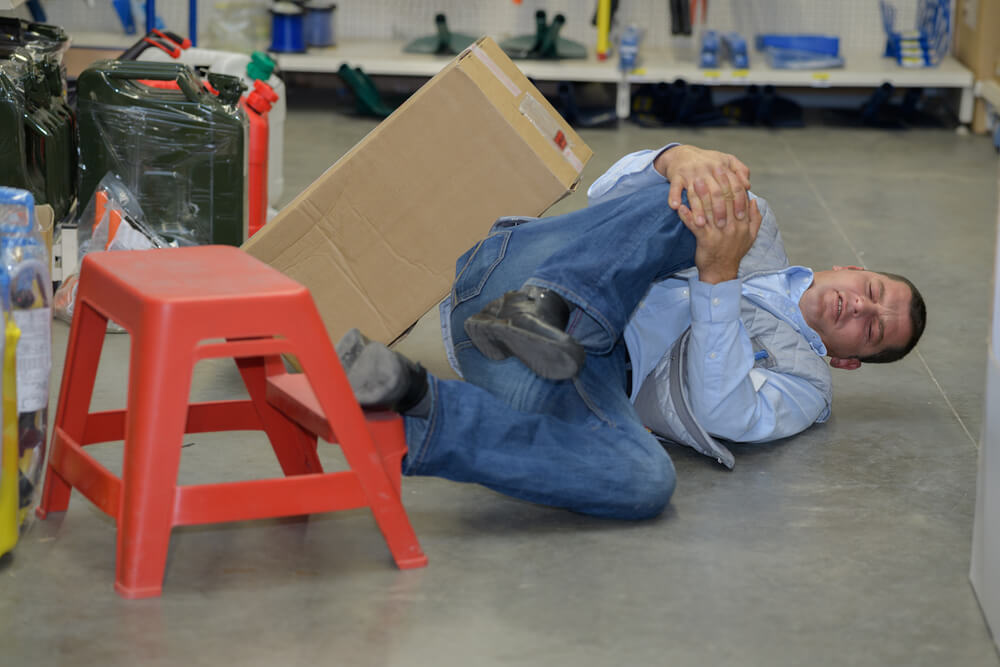

Having an accident at work can be stressful and frightening, especially if you feel like it was your own fault.
It is normal in that situation to worry about being in trouble or losing your job.
However, even if an accident was caused by your own actions, you still have certain rights under UK law.
In this article, we will explain what to expect if you have an accident at work that was your fault.
What Happens If I Have An Accident And It’s My Fault?
If you have an accident at work that you believe was caused by your own actions, it is understandable to be worried about the consequences.
However, there are certain procedures that legally must be followed, regardless of who was at fault.
The first and most important thing is that you must report the accident to your employer straight away, even if you were solely responsible.
All accidents at work, minor or major, must be recorded and investigated.
When you report what happened, be completely honest about your own role in the accident.
Attempting to conceal your fault could be considered misconduct later, if discovered. Honesty
is always the best policy when it comes to workplace accidents.
Your employer then has a duty to investigate the accident, identify causes and contributing factors, and see what lessons can be learned. This applies whether it was your fault or not. The aim is to
improve safety standards and prevent recurrences.
You may have to provide verbal or written statements during the investigation. Explain what happened truthfully, but avoid speculating on causes or outcomes. Stick to the facts, as you know them.
What Are The Reporting Procedures Following An Accident At Work?
Once an accident is reported, certain procedures should kick in:
- You should be provided with first aid or medical treatment immediately for any injury sustained.
- The incident may have to be reported to the Health and Safety Executive (HSE)
depending on the severity and type of injury. Not all accidents require reporting, but
serious cases involving hospitalisation or time off work usually do. Failure to report an accident that should be reported is a breach of UK health and safety law.
- Your workplace’s health and safety representative should be informed so that they can get involved in the investigation, if appropriate.
- For major incidents, the scene may need to be temporarily closed off or left untouched to allow a proper examination of causes.
- Witness statements will be taken as part of the investigation. You may also be asked to give your account of what happened and why.
- CCTV footage may be reviewed, if available.
- The result of the investigation must be documented. This includes any recommended action points to prevent reoccurrence.
- Records of the accident and investigation must be kept for several years. Your employer cannot just pretend it never happened.
The investigation and reporting procedures will be the same regardless of who is deemed responsible. The priority should be understanding how and why the incident occurred.
Could I Face Disciplinary Action or Dismissal?
The biggest worry of many employees, after an accident, is whether they will face disciplinary action such as a warning or even dismissal.
However, a fair employer should not rush to discipline without following a fair and proper process first.
Disciplinary action is only likely to happen if the investigation finds that your actions amounted to negligence or serious misconduct.
If you made an honest mistake while following correct procedures, you are unlikely to face reprimand.
The severity of discipline would depend on:
- The seriousness of your actions and the degree of negligence. Was it a minor breach of safety or wilful recklessness?
- Whether anyone was seriously harmed or put at risk.
- Your previous disciplinary record and general work performance. A long-term employee with an unblemished record may be treated more leniently than someone with previous lapses.
- Whether you were properly trained and informed about safe procedures for the task.
- Any mitigating circumstances that may have contributed, even if it was mainly your fault.
The potential penalties could range from:
- Verbal or written warning.
- Final written warning.
- Dismissal, (for gross negligence or dangerous conduct).
However, your employer should follow fair disciplinary procedures before imposing any sanctions. This includes informing you of the allegations, allowing you to give your account plus supporting evidence and considering if warnings may suffice before dismissal.
If you feel you have been treated unreasonably harshly, you can raise a formal grievance with your employer. You may also wish to seek formal legal advice .
Can You Claim For An Accident At Work If It Was Your Fault?
Generally, if it was solely down to your own actions or failings, you cannot seek compensation for an accident at work from your employer.
You will not be able to recover compensation for an injury caused entirely by your own negligence.
However, you may still have grounds for a claim if:
- Your employer’s negligence contributed in some way – e.g., lack of training or faulty equipment.
- You made an honest mistake while following standard procedures.
- Your employer was aware you lacked skills or experience for the task but still asked you to do it.
- It was partly your fault but also partly your employer’s fault. Your compensation may be reduced by a percentage the court deems fair – known as contributory negligence.
Our experienced personal injury lawyers can advise on whether you may have a viable claim after assessing the accident circumstances and your employer’s role.
While being at fault means compensation is harder to obtain, it should not deter you from
reporting your accident or seeking legal advice.
Your employer must still follow proper and fair procedures to investigate, report, and potentially discipline. You should seek legal advice if you believe that you have been treated unfairly, for assistance in protecting your rights. If you’ve been involved in an accident at work and would like to seek legal advice, contact us here or call us on 020 3440 8000.
Disclaimer: The information on the TV Edwards website is for general information only and reflects the position at the date of publication.








